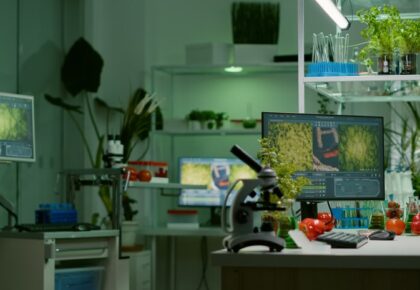
The world is rapidly changing, and so is the agritech industry. In recent years, we have witnessed a significant shift in agriculture, with tech advancements transforming the industry. These advancements have been made possible by innovative technologies, such as big data, artificial intelligence (AI), and the Internet of Things (IoT), among others. Such innovations enabled farms to improve the efficiency and productivity of farming, leading to higher yields and better crop quality.
One of the major challenges that the agriculture industry faces is the scarcity of farming land, which presents a significant challenge for farmers who need to produce more food to feed the growing population. Fortunately, technology is making it possible to maximize the use of existing farmland through techniques such as precision farming, vertical farming, AI and hydroponics.
Vertical farming technology involves growing crops in vertically stacked layers using artificial light and climate control. This technique uses 95% less water and no pesticides than conventional field farming, making it an environmentally friendly option for food production. This method also enables farmers to grow crops in areas where conventional farming is impossible, such as in urban areas with limited land space. Vertical farming technology is revolutionizing the agriculture industry, making it possible to produce fresh, healthy, and sustainable food in an efficient and cost-effective way.
Another significant advancement in agriculture is precision farming. Precision farming involves using sensors, GPS technology, and other data analytics tools to collect and analyze data about soil conditions, weather patterns, and crop growth. This data is then used to optimize crop production by providing farmers with real-time information about when to irrigate, fertilize, and harvest crops. Resulting in higher yields, better crop quality, and lower production costs.
Hydroponics is another innovative farming method that is rapidly gaining popularity. This method involves growing plants without soil, using nutrient-rich water solutions. Hydroponics systems are highly efficient, using much less water than traditional farming methods, making them an ideal solution for areas with water scarcity. Additionally, hydroponics systems can be used to grow crops in urban areas, where there is limited land space, making it possible to produce fresh, healthy, and sustainable food in cities.
The use of drones in agriculture is another significant technological advancement that is transforming the agriculture sector. Drones are used to monitor crops, assess crop health, and identify areas that require additional attention. They can also be used to spray crops with pesticides and fertilizers, reducing the need for manual labor and improving the efficiency of crop production. With the use of drones, farmers can monitor crop health and growth in real-time, enabling them to make better decisions about when to plant, irrigate, and harvest crops.
Artificial intelligence (AI) is also playing an increasingly important role in agriculture as it is currently being used to analyze large amounts of data, such as weather patterns, soil conditions, and crop growth, to identify patterns and make predictions about future crop yields. This information can be used to optimize crop production, reducing costs and improving yields. Additionally, AI can be used to identify plant diseases and pests, enabling farmers to take quick action to prevent crop damage.
Technology is rapidly transforming the agriculture industry, enabling farmers to produce more food in an efficient, sustainable, and cost-effective way. The use of innovative technologies, such as precision farming, vertical farming, drones, hydroponics, and AI, is redefining the way we produce, distribute, and consume food. These advancements have the potential to address some of the major challenges of the agriculture sector, such as the scarcity of farming land, the need to produce more food to feed a growing population, and the impact of climate change on crop production.
As the world continues to urbanize, and the population continues to grow, the demand for food is set to increase. To meet this demand, it is imperative that the agriculture industry embraces technology and innovation to optimize production and ensure food security for all. The Agritech market is forecast to grow at a CAGR of 11.3% in the next years, indicating the significant potential for technological advancements to revolutionize the agriculture industry.
However, it is essential to ensure that these technological advancements are accessible to all farmers, including smallholder farmers in developing countries who may not have the financial resources to invest in expensive technology. Governments and private sector organizations should work together to ensure that technology is accessible and affordable for all farmers, regardless of their location or financial status.
In conclusion, the advancements in technology are transforming the agriculture industry, leading to increased efficiency, productivity, and sustainability. The adoption of tech in agriculture is paving the way for a future where food production is optimized, and food security is ensured for all. If you wish to learn more about the current matters of the agriculture industry, as well as the most prominent investment areas of this sector, be sure to check our LinkedIn post about the topic.











